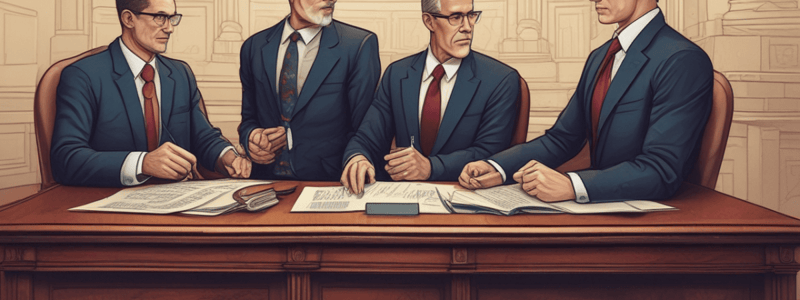Podcast
Questions and Answers
What are the different roles that an expert can play in a civil case?
What are the different roles that an expert can play in a civil case?
- Testifying expert (correct)
- Treating physician (correct)
- Consultant (correct)
- Inspector (correct)
Expert testimony is excluded when the matter is common knowledge or readily perceivable without expert testimony.
Expert testimony is excluded when the matter is common knowledge or readily perceivable without expert testimony.
True (A)
What are some questions you should ask yourself when deciding whether an expert is needed?
What are some questions you should ask yourself when deciding whether an expert is needed?
- What facts are available to establish the elements of what I am claiming?
- Could a lay jury of my peers decide this situation without drawing on specialized knowledge (or replacing that knowledge with their personal language and bias)?
- Are there any complex circumstances that would be better understood through data analysis or visual representations?
Match the factors to consider when selecting experts with their descriptions:
Match the factors to consider when selecting experts with their descriptions:
How can one effectively prepare to interview experts?
How can one effectively prepare to interview experts?
Why is it important to communicate regularly with your expert throughout the case?
Why is it important to communicate regularly with your expert throughout the case?
Experts are generally protected from contact by opposing parties under attorney work product privilege.
Experts are generally protected from contact by opposing parties under attorney work product privilege.
Flashcards are hidden until you start studying
Study Notes
Experts in a Civil Case
- An expert can be a consultant, treating physician, inspector, testifying expert, or more.
- An expert who will not testify at trial is primarily referred to as a consultant or an expert consultant.
Why Do We Need Experts?
- Experts are needed to determine issues outside the common experience of the trier of fact.
- Experts provide missing links for the jury by explaining technical terminology and utilizing accurate and clear data presentation tools.
- Expert testimony is permissible when the subject matter is sufficiently beyond common experience that expert testimony would assist the trier of fact.
When Experts' Testimony is Excluded
- Experts' testimony is excluded when a matter is common knowledge or readily perceivable without expert testimony.
- Experts' testimony is excluded when it adds nothing new or requires commentary on issues that are within the province of the court.
When to Hire an Expert
- Ask yourself:
- What facts are available to establish the elements of what I am claiming?
- Could a lay jury of my peers decide this situation without drawing on specialized knowledge?
- Are there any complex circumstances that would be better understood through data analysis or visual representations?
- Sooner is often better, but hiring an expert might actually hurt your client when liability is unclear or damages are insignificant.
How to Effectively Utilize Experts
- Factors to consider when selecting experts:
- Blend of legal acumen and empirical or treatment-based approach
- Check with other attorneys for reliability and history
- Check databases like LexisNexis for testimony and side victory
- Check court dockets for reputation and history
- How to prepare to interview experts:
- Prepare a simple outline of the major factors of the case
- Have supporting information and documentation available
- Don't get defensive about the facts
- Verify if they're willing to testify
- Factors to consider when reviewing a potential expert:
- Qualifications (training, knowledge, and experience)
- Reputation and credibility (publications, lectures, etc.)
- Communication skills
- Location
- Fees for consultation and testimony
Expert Strategy Meetings
- Preparing for the strategy meeting:
- Provide all case facts, documents, and demonstrative evidence
- Request a more in-depth and specific offering of the expert's opinion and a schedule for completing the research and work
- Questions to ask during the strategy meeting:
- Does the expert have enough information to render an opinion?
- What further information is needed?
- What are the noticeable weaknesses in the case, and how might they be addressed?
- What specific information could be obtained through discovery to help the expert?
- What is the best theory on which to build the client's position?
Communicating with Experts
- Communicate regularly with your expert regarding the case, especially as to those facts which most concern their eventually conclusions
- Provide updates whenever available, but know that all of an expert's file becomes discoverable when they are designated as an expert witness
Communicating with Opposing Experts
- Protections for experts:
- Consultants and physicians are generally protected from contact from the opposing side by attorney work product privilege
- Treating physicians are also protected by physician-patient privilege
- The exception is by the statutory routes of discovery, such as by a noticed deposition and subpoena for appearance
Studying That Suits You
Use AI to generate personalized quizzes and flashcards to suit your learning preferences.




